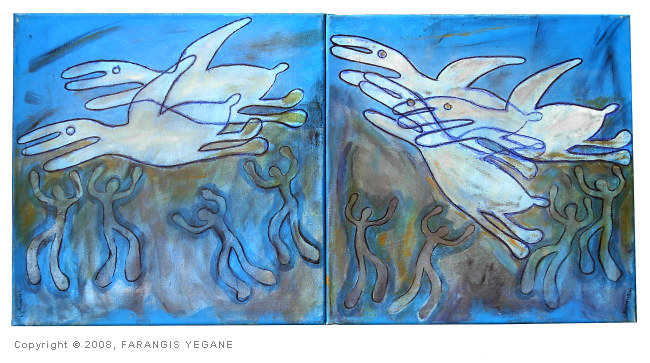Image: Farangis Yegane http://crownofthecreation.farangis.de
This is from my short fragment series: neo-vegan perspectives
Animal Rights and Human Rights, your rights, as interconnected
Palang Latif
How can Animal Rights and Human Rights be interlocked politically in a constructive way, instead of using Human Rights against Animal Rights.
We often tend to think that Animal Rights and Human Rights would exclude each other, and the stereotypical AR vs. HR question, about whom you would save first if you had to: your dog or your child, is being asked as if one had to pass a witch-test which is going to decide your fate as a proper Human- or Animal Rights advocate. A more reasonable view would let us come to the conclusion that narrowing things down to the extremes isn’t really a good approach upon which a rights debate can be lead.
The focus in such a question that seeks to radically separate two instances (two situative phenomena occurring in a wider context) from each other, is almost suggestive, if not ignorant, in its view towards the facets of reality that make up the complexity of life as the living beings experience it.
Put in a situation where we had to decide between rescuing one living being and another, it is likely that we would not want to decide for one and against the other. We should consider the perspectival option that we’d want to save every being that’s in despair or in a desperate situation. We could think: in any situation where a being needs help, a being needs a helper!
As Animal Rights advocates
As Animal Rights people we clearly want both: a full consideration of human interests and rights and a full consideration of what we can understand to be the rights other animals are natural holders of – by virtue of their self-autonomous existence in this world.
And to take this a step further: we probably want to interlock Animal and Human Rights, so that both reaffirm and solidify each other. How can this be reached? And how can this, even more so, be reached in our current human societies, where Animal Rights is not regarded as positively relevant for the “’own’ – collective human concern”.
One aspect that builds an euphemistically put “automatic” way to bind Animal- and Human Rights together, is, as simple as it may sound: the environment. Whereby ‘the environment’ can be a term for what the German poet-thinker Goethe more comprisingly called “das All-Leben”, the all-live – a term that hints at the interconnectedness of all life forms on earth and beyond.
The environment, nature, is the habitat of nonhuman animals and humans alike. It’s the sphere of living existence where both humans and nonhuman animals meet in their natural state of being, and it’s the very political ground ( that is: a sphere of life and thus of interests) that needs to be re-captured for the ethical side that is to it in regards to Animal Liberation and Animal Rights.
There are three core aspects that bind humans and animals together in their enviromentalistic and nature bound context:
A.) Existentially we got the shared ‘outer world’ on which life depends in its individual and collective existential value.
B.) The conflict between the (major) life forms is produced by ‘the culture’ in which life finds its contextualization, ranging from predominantly destructive in homocentric human societies and, environmentally seen, constructive in animal cultures and their form of relating to the natural.
C.) The solution, the bridge, lays in the will for re-establishing a natural balance, that encompasses its participants, the living beings, as co-creatant, co-existential “agents of an self-created contextualizing existence” – that can be understood as something that we emotionally would induce with “dignity”.
Dignity is the felt and the realizable foundation of Rights. Being co-existent in this world and acknowledging the agency of nonhuman animals in the environmental context is a basis that should tie Human- and Animal Rights constructively.
